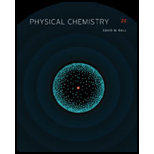
Physical Chemistry
2nd Edition
ISBN: 9781133958437
Author: Ball, David W. (david Warren), BAER, Tomas
Publisher: Wadsworth Cengage Learning,
expand_more
expand_more
format_list_bulleted
Question
Chapter 15, Problem 15.57E
Interpretation Introduction
Interpretation:
The reason as to why heating a potentially laser-active material does not result in population inversion is to be stated.
Concept introduction:
Laser is an abbreviation of “Light Amplification by Stimulated Emission of Radiation”. The laser gives light after the amplification process. The energy of light after the amplification process is so high that this device can be used to cut a thick metal sheet.
Expert Solution & Answer
Want to see the full answer?
Check out a sample textbook solution
Students have asked these similar questions
First image: I have to show the mecanism for the reaction on the left, where the alcohol A is added fast in one portion
Second image: I have to show the mecanism of the reaction at the bottom. Also I have to show by mecanism why the reaction wouldn't work if the alcohol was primary
First image: I have to explain why the molecule C is never formed in those conditions.
Second image: I have to propose a synthesis for the lactone A
First image: I have to explain why the molecule C is never formed in these conditions
Second image: I have to propose a synthesis for the lactone A
Chapter 15 Solutions
Physical Chemistry
Ch. 15 - Linearly polarized light can be assigned a...Ch. 15 - Linearly polarized light can be assigned a...Ch. 15 - Prob. 15.3ECh. 15 - Determine the value of R for deuterium (2H) and...Ch. 15 - Prob. 15.5ECh. 15 - Draw a Grotrian-type diagram for the first four...Ch. 15 - What is the value of the change in energy, E, for...Ch. 15 - Prob. 15.8ECh. 15 - List the possible values of L, ML, S, MS, J, and...Ch. 15 - Prob. 15.10E
Ch. 15 - Prob. 15.11ECh. 15 - Prob. 15.12ECh. 15 - Prob. 15.13ECh. 15 - What is the term symbol for the ground state of a...Ch. 15 - Prob. 15.15ECh. 15 - Prob. 15.16ECh. 15 - Prob. 15.17ECh. 15 - Prob. 15.18ECh. 15 - Prob. 15.19ECh. 15 - Prob. 15.20ECh. 15 - Prob. 15.21ECh. 15 - Prob. 15.22ECh. 15 - Use Hunds rules to predict the term symbol of the...Ch. 15 - Prob. 15.24ECh. 15 - Prob. 15.25ECh. 15 - An Mg atom is in the excited electron...Ch. 15 - Prob. 15.27ECh. 15 - Prob. 15.28ECh. 15 - Prob. 15.29ECh. 15 - Prob. 15.30ECh. 15 - Use group-theoretical arguments to determine the...Ch. 15 - The GeF molecule, which exists in the gas phase at...Ch. 15 - The SrH molecule in a 2+ electronic ground state....Ch. 15 - Prob. 15.34ECh. 15 - What are the values of and for NF in its 3...Ch. 15 - Prob. 15.36ECh. 15 - Determine the ground-state term symbol of the...Ch. 15 - Prob. 15.38ECh. 15 - Prob. 15.39ECh. 15 - Prob. 15.40ECh. 15 - Prob. 15.41ECh. 15 - Prob. 15.42ECh. 15 - The 1, 1'-diethyl-2, 2'-dicarbocyanine cation has...Ch. 15 - Prob. 15.44ECh. 15 - Naphthacene, C18H12, consists of four benzene...Ch. 15 - Prob. 15.46ECh. 15 - Prob. 15.47ECh. 15 - Construct the Hckel determinants for...Ch. 15 - Prob. 15.49ECh. 15 - Using the Internet, find a Hckel determinant...Ch. 15 - Prob. 15.51ECh. 15 - Explain why cyclopentadiene easily accepts an...Ch. 15 - Prob. 15.53ECh. 15 - Prob. 15.54ECh. 15 - Prob. 15.55ECh. 15 - Prob. 15.56ECh. 15 - Prob. 15.57ECh. 15 - Prob. 15.58ECh. 15 - Would the light from fireflies be considered an...Ch. 15 - Prob. 15.60ECh. 15 - Prob. 15.61ECh. 15 - Prob. 15.62ECh. 15 - How many 632.8-nm photons must a He-Ne laser emit...Ch. 15 - Prob. 15.64ECh. 15 - Green He-Ne lasers are also available; they emit...Ch. 15 - Blu-ray disks and high-density DVDs use an indium...Ch. 15 - Prob. 15.67ECh. 15 - Explain why X-ray lasers would be extremely...Ch. 15 - Prob. 15.69E
Knowledge Booster
Similar questions
- help 20arrow_forwardProvide the drawing of the unknown structure that corresponds with this data.arrow_forward20.44 The Diels-Alder reaction is not limited to making six-membered rings with only car- bon atoms. Predict the products of the following reactions that produce rings with atoms other than carbon in them. OCCH OCCH H (b) CH C(CH₂)s COOCH མ་ནས་བ (c) N=C H -0.X- (e) H C=N COOCHS + CH2=CHCH₂ →→arrow_forward
arrow_back_ios
SEE MORE QUESTIONS
arrow_forward_ios
Recommended textbooks for you
 Physical ChemistryChemistryISBN:9781133958437Author:Ball, David W. (david Warren), BAER, TomasPublisher:Wadsworth Cengage Learning,
Physical ChemistryChemistryISBN:9781133958437Author:Ball, David W. (david Warren), BAER, TomasPublisher:Wadsworth Cengage Learning, Principles of Instrumental AnalysisChemistryISBN:9781305577213Author:Douglas A. Skoog, F. James Holler, Stanley R. CrouchPublisher:Cengage Learning
Principles of Instrumental AnalysisChemistryISBN:9781305577213Author:Douglas A. Skoog, F. James Holler, Stanley R. CrouchPublisher:Cengage Learning Principles of Modern ChemistryChemistryISBN:9781305079113Author:David W. Oxtoby, H. Pat Gillis, Laurie J. ButlerPublisher:Cengage Learning
Principles of Modern ChemistryChemistryISBN:9781305079113Author:David W. Oxtoby, H. Pat Gillis, Laurie J. ButlerPublisher:Cengage Learning Chemistry for Engineering StudentsChemistryISBN:9781285199023Author:Lawrence S. Brown, Tom HolmePublisher:Cengage Learning
Chemistry for Engineering StudentsChemistryISBN:9781285199023Author:Lawrence S. Brown, Tom HolmePublisher:Cengage Learning

Physical Chemistry
Chemistry
ISBN:9781133958437
Author:Ball, David W. (david Warren), BAER, Tomas
Publisher:Wadsworth Cengage Learning,

Principles of Instrumental Analysis
Chemistry
ISBN:9781305577213
Author:Douglas A. Skoog, F. James Holler, Stanley R. Crouch
Publisher:Cengage Learning

Principles of Modern Chemistry
Chemistry
ISBN:9781305079113
Author:David W. Oxtoby, H. Pat Gillis, Laurie J. Butler
Publisher:Cengage Learning


Chemistry for Engineering Students
Chemistry
ISBN:9781285199023
Author:Lawrence S. Brown, Tom Holme
Publisher:Cengage Learning